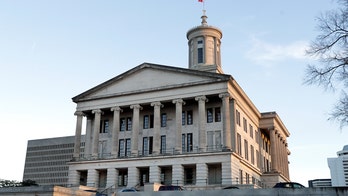Ex-Attorney General: War on 'ObamaCare' far from over
Former Florida attorney general who started legal challenge to president's health care law says Supreme Court ruling may be a blessing in disguise
"ObamaCare" stands, but the battle over the law is far from over.
In its 5-4 decision, the Supreme Court ruled that the so-called individual mandate could be upheld only because it fell within Congress' authority to tax. However, that is not how the Obama administration originally sold it.
In fact, in a 2009 interview, President Obama adamantly rejected the notion that the penalty for not buying insurance amounted to a tax hike.
"You can't just make up that language and decide that that's called a tax increase," Obama said, scolding his interviewer.
Now that the high court says it is a tax, Republicans say the law will be more unpopular.
And the fight will surely go on.
Much like the 1973 Roe v. Wade decision, politicians and voters are likely to litigate the issue for years to come -- in Congress and the courts and the public square. In the near term, Republicans will re-double their efforts to push for repeal in Congress. And some claim the Supreme Court has handed them a winning argument.
"(Americans will) like it even less when they understand it's a tax," Sen. Mike Lee, R-Utah, told Fox News.
He cautioned that anyone who subsequently votes in favor of the law in Congress "will do so at their own political peril."
Sen. Lindsey Graham, R-S.C., called Chief Justice John Roberts, who sided with the majority, a "genius."
Graham said the law never would have passed if the mandate penalty were presented as a tax, claiming the ruling will redound to Republicans' benefit.
President Obama said Thursday that his administration will proceed with implementation, saying "the highest court in the land has now spoken" and urging Republicans to "move forward." He said he won't "re-fight the political battles of two years ago."
He may have to.
On one track, Republicans plan to rally voters around presidential candidate Mitt Romney as he vows to make repealing the law his Day One priority if elected. On another track, Republicans in Congress will pick up the repeal push even before November -- starting with a repeal vote next month in the House. And that's to say nothing of the remaining legal challenges against the law, such as the multi-party challenge to the so-called contraception mandate.
Sen. Marco Rubio, R-Fla., and several other prominent Republicans said the ruling effectively turns back the clock on the political debate -- which recently has centered almost exclusively on job creation.
"In many respects, we're back where we were when I ran for office in 2010," he said. "This now becomes a central issue again."
Rubio warned that the law would hurt economic growth, in part by letting the IRS fine -- or rather, tax -- Americans who don't buy health insurance.
Conservatives suggested the ruling could end up being a political gift, by re-energizing opposition to the law and their own party's candidates in the fall.
Lee, a Tea Party-backed senator who won election in 2010 thanks in part to backlash over the law, claimed Thursday that the Democrats' sense of victory would be "fleeting and short-lived and really illusory."
Defenders of the law, though, viewed the ruling as nothing but an absolute victory.
Rep. Charlie Rangel, D-N.Y., told Fox News that the ruling "gives us the opportunity to re-sell the bill, which we did not do before."
House Democratic Leader Nancy Pelosi, a champion of the Affordable Care Act, dismissed concern over the court, calling the mandate penalty a tax. She said Democrats would "take yes for an answer."
Obama rattled off several more popular consumer protections in the law in arguing that it's time to "move forward."
He said he's more confident than ever that Americans will be "better off" thanks to the law and the court's decision to uphold it.





